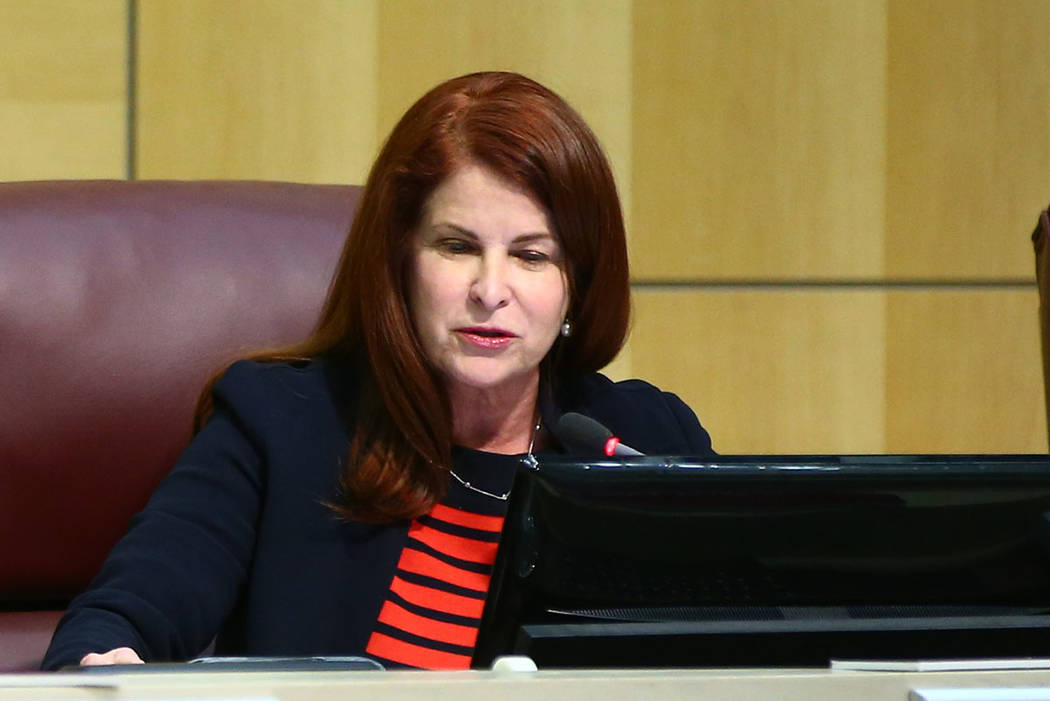Henderson Mayor March’s campaign spends big, but she isn’t on ballot
Henderson Mayor Debra March did not run for office last year, but she still spent more than $60,000 of her campaign’s money.
March, who was elected mayor in April 2017, spent thousands of dollars at gas stations and restaurants in Nevada. She also funded a trip outside the country and to California’s Napa Valley, all without raising any money for her war chest.
The mayor of Nevada’s second-largest city doesn’t face re-election until 2021, but she said her spending was aboveboard. In part, she attributed the charges to building relationships with potential donors.
But she also said she racked up her own expenses helping other candidates who were on the ballot or going into an election year. It’s an explanation some candidates reject and one that puzzles one of Nevada’s top election officials.
“I have never heard of anyone doing that,” said Wayne Thorley, the deputy secretary of state for elections in Nevada.
Among the charges was more than $1,800 on airfare and a vacation package for a trip to Panama with Sallie Doebler, vice president of corporate partnerships for the Las Vegas Metro Chamber of Commerce. March spent an additional $285 at a Panama City hotel, campaign finance records show.
March said Doebler planned the trip, but she paid for it, saying it related to campaigning because it was an opportunity to build a strong relationship with someone she described as an “influencer” who could help her network in the future. March said she also met with another mayor who was visiting from Texas.
Doebler did not respond to requests for comment.
A spokeswoman for the secretary of state said the office would not be able to tell whether the charges for the trip were improper without conducting its own investigation.
If someone appears to have violated campaign finance law, the secretary of state’s office may investigate the claim itself or refer a potential violation to the attorney general.
Inconsistent claims
March did not receive any campaign contributions last year but said she spent time advising and fundraising for other candidates instead.
“I wasn’t going to go out and fundraise while other people were fundraising for their campaigns,” March said during a Feb. 20 interview.
March said she helped Reno Mayor Hillary Schieve, Assembly candidate Richard Fletcher, now-Attorney General Aaron Ford and several other Las Vegas Valley candidates.
She financially contributed to many of the candidates she claimed to have helped and appeared in commercials for both Clark County District Attorney Steve Wolfson and now-Nevada Supreme Court Justice Elissa Cadish. In total, March spent more than $23,500 on political and nonprofit contributions. Such donations are legal and common in Nevada.
But some of the candidates rejected her claims.
“She did not campaign with me or anything like that,” Schieve said Tuesday. Records show March did not contribute money to Schieve’s campaign last year.
March’s campaign spokeswoman, Elizabeth Trosper, said March spoke with Schieve at length about the campaign over dinner in Boston. Schieve said the topic of her campaign may have come up, but she did not recall the specifics.
Schieve said March did not promote her and did not raise money for her.
Before a reporter spoke with Schieve to verify March’s story, the Henderson mayor texted Schieve to remind her about the dinner in Boston and the public support she offered on Facebook, according to Schieve.
March also said she helped Assemblywoman Melissa Hardy during last year’s election, but Hardy said March was not involved in her campaign whatsoever. The two never met privately, raised money together or strategized, Hardy said.
“I have no idea what she’s referencing in regards to me,” Hardy said. March did not contribute to Hardy’s campaign.
Fletcher, a former Metropolitan Police Department captain, said March never contributed to his campaign or met with him over coffee or lunch. He said March never raised money for him, and he was unaware of any promotional efforts from her.
“She gave me some very generic advice just based on friendship,” Fletcher said.
The two met once during the course of the campaign so Fletcher could give March rifle ammunition for hunting, he said. The conversation mostly focused on hunting, he said.
After Fletcher was first asked about March’s involvement in his campaign, he said the mayor reminded him that she had agreed to appear at a meet-and-greet for elected officials at his homeowner association. The purpose of the meeting, he said, was to give his neighbors a chance to meet city leaders and to give his campaign more visibility. The event never materialized.
Listed on March’s campaign finance report is a charge in Battle Mountain, where March said she met with Assemblywoman Heidi Swank.
Swank said in a statement that she and March both sat on the Legislative Committee on Public Lands during the interim period last year.
March purchased breakfast for her when the committee met in Battle Mountain and claimed she discussed Swank’s campaign with her.
Swank did not face a challenger in either the primary or general election last year.
“I do not recall having any conversations about my campaign that day,” Swank said. To her knowledge, Swank said, March did not do campaign work on her behalf.
March also said she helped former councilman and current Henderson judge Sam Bateman during his election. Bateman raised no money, spent no money and coasted to victory in June without a challenger.
Unique among mayors
The mayor’s spending diverges from her fellow mayors in the Las Vegas Valley, who were either entering an election year or considering bids for higher office.
Last year, Las Vegas Mayor Carolyn Goodman, who this year is running for a third term, spent less than half of what March spent on the campaign trail in 2018, campaign finance records show. North Las Vegas Mayor John Lee spent slightly more than March, and nearly half of his spending went to a polling company while he contemplated a run for Congress.
Last year, March spent more than $3,000 at gas stations. She also racked up charges in excess of $2,300 at restaurants, coffee shops and bakeries in expenses her campaign labeled as “office expenses” or miscellaneous.
March said she lives close to City Hall, so her fuel charges to travel to work are insignificant. The gas money, she said, was for other activities in the community. “A lot of them,” she said, were campaign-related.
“And I ran that past my accountant before I did it to see if this is a normal charge,” March said.
The firm — Piercy, Bowler, Taylor and Kern — did not respond directly to requests for comment but said through Trosper that it does not talk to media under any circumstances.
March spent nearly $1,200 for two nights at Rancho Caymus Inn, a boutique hotel in Napa Valley.
She said she made the trip to meet with Raiders owner Mark Davis and team president Marc Badain — both frequent visitors to the Las Vegas Valley — during the team’s summer training camp, which is regularly held in Napa.
The meeting came months after March helped the team secure land in west Henderson for a practice facility at a 50 percent markdown from market value.
March’s other charges included about $1,300 in Christmas gifts for staff and donors, according to Trosper. March said she has several volunteers and three paid staffers on her campaign, including Trosper and two accountants.
According to a 2002 attorney general opinion, Nevada’s campaign finance law was written to resemble federal law, which allows spending on gifts for holidays if the recipients are not family.
Despite facing conflicting statements from candidates she claimed to have helped, March is not backing down from the assertion that her spending last year was campaign-related.
“The mayor does stand by everything she said originally,” Trosper said.
^
Contact Blake Apgar at bapgar@reviewjournal.com or 702-387-5298. Follow @blakeapgar on Twitter.























